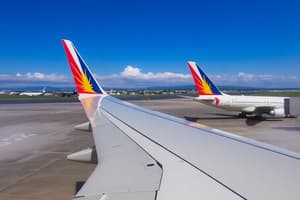Podcast
Questions and Answers
Air Operator Certificates (AOC) are issued only to domestic airlines.
Air Operator Certificates (AOC) are issued only to domestic airlines.
False (B)
Establishing approval processes for adjustments and refunds is unnecessary since operational systems automatically prevent unauthorized changes.
Establishing approval processes for adjustments and refunds is unnecessary since operational systems automatically prevent unauthorized changes.
False (B)
Revenue data reconciliations should only be performed annually to limit operational interruptions.
Revenue data reconciliations should only be performed annually to limit operational interruptions.
False (B)
The general ledger should not include any adjustments related to discounts or cancellations without prior authorization.
The general ledger should not include any adjustments related to discounts or cancellations without prior authorization.
Operational systems such as booking systems are irrelevant for revenue data accuracy.
Operational systems such as booking systems are irrelevant for revenue data accuracy.
The Civil Aviation Authority of the Philippines (CAAP) is responsible for implementing policies to ensure unsafe air travel.
The Civil Aviation Authority of the Philippines (CAAP) is responsible for implementing policies to ensure unsafe air travel.
Certificates of Public Convenience and Necessity (CPCN) are issued to foreign carriers.
Certificates of Public Convenience and Necessity (CPCN) are issued to foreign carriers.
The Air Passenger Bill of Rights protects consumers regarding delays and cancellations.
The Air Passenger Bill of Rights protects consumers regarding delays and cancellations.
R.A. 9497, enacted in 2008, established the Civil Aeronautics Board (CAB).
R.A. 9497, enacted in 2008, established the Civil Aeronautics Board (CAB).
The Civil Code outlines the responsibilities of common carriers, including airlines.
The Civil Code outlines the responsibilities of common carriers, including airlines.
Regular reconciliations between operational systems and the general ledger are essential for ensuring the completeness and accuracy of recorded revenue.
Regular reconciliations between operational systems and the general ledger are essential for ensuring the completeness and accuracy of recorded revenue.
CAAP is responsible for conducting inspections and enforcing compliance with aviation laws.
CAAP is responsible for conducting inspections and enforcing compliance with aviation laws.
R.A. 776 was established to enhance international standards in Philippine aviation.
R.A. 776 was established to enhance international standards in Philippine aviation.
The airline industry in the Philippines consists of over 10 airports equipped to handle international flights.
The airline industry in the Philippines consists of over 10 airports equipped to handle international flights.
Philippine Airlines was founded in the year 1941.
Philippine Airlines was founded in the year 1941.
The four major commercial airlines in the Philippines include Cebu Pacific, Air Asia, Philippine Airlines, and Delta Airlines.
The four major commercial airlines in the Philippines include Cebu Pacific, Air Asia, Philippine Airlines, and Delta Airlines.
Low-Cost Carriers offer lower ticket prices compared to Full-Service Airlines, but with fewer conveniences.
Low-Cost Carriers offer lower ticket prices compared to Full-Service Airlines, but with fewer conveniences.
There are 28 airports in the Philippines primarily used for domestic travel.
There are 28 airports in the Philippines primarily used for domestic travel.
The primary airport serving Manila is called the Ninoy Aquino International Airport (NAIA).
The primary airport serving Manila is called the Ninoy Aquino International Airport (NAIA).
The airline industry does not play a significant role in the economy of the Philippines.
The airline industry does not play a significant role in the economy of the Philippines.
The Department of Commerce and Communications established an office to handle airline matters in 1941.
The Department of Commerce and Communications established an office to handle airline matters in 1941.
Loyalty points earned by passengers can be considered deferred revenue until they are redeemed.
Loyalty points earned by passengers can be considered deferred revenue until they are redeemed.
Ground Property and Equipment under PAS 16 does not include leasehold improvements.
Ground Property and Equipment under PAS 16 does not include leasehold improvements.
Unit Depreciation is applied to groups of similar assets in the airline industry.
Unit Depreciation is applied to groups of similar assets in the airline industry.
The Airlines Company must review leases under PFRS 16 to classify them as either finance or operating leases.
The Airlines Company must review leases under PFRS 16 to classify them as either finance or operating leases.
Depreciation for similar assets grouped together is known as group depreciation.
Depreciation for similar assets grouped together is known as group depreciation.
Air Travel means the same as Loyalty Points.
Air Travel means the same as Loyalty Points.
Physical inspections of aircraft are unnecessary for verifying their existence and condition.
Physical inspections of aircraft are unnecessary for verifying their existence and condition.
Aircraft and related equipment usually consist of flight equipment, ground property, and equipment.
Aircraft and related equipment usually consist of flight equipment, ground property, and equipment.
Air Traffic Liability includes the value of unused transportation sold by the reporting air carrier.
Air Traffic Liability includes the value of unused transportation sold by the reporting air carrier.
Travel Agency Sales refer to ticket sales made directly by the airline at its city offices.
Travel Agency Sales refer to ticket sales made directly by the airline at its city offices.
Unused tickets should only be counted as revenue when the ticket is sold.
Unused tickets should only be counted as revenue when the ticket is sold.
An Operating Lease allows the lessee to retain most of the risks and rewards of ownership.
An Operating Lease allows the lessee to retain most of the risks and rewards of ownership.
Audit objectives for Aircraft and Engine Lease include confirming the accuracy of lease payments.
Audit objectives for Aircraft and Engine Lease include confirming the accuracy of lease payments.
A Finance Lease typically has a shorter lease term than the asset's useful life.
A Finance Lease typically has a shorter lease term than the asset's useful life.
Regularly reviewing accounts with unused tickets helps ensure their accuracy until the flight is taken.
Regularly reviewing accounts with unused tickets helps ensure their accuracy until the flight is taken.
Lessee retains ownership of aircraft and engines in an Operating Lease.
Lessee retains ownership of aircraft and engines in an Operating Lease.
Flashcards are hidden until you start studying
Study Notes
Airline Industry Overview
- The airline industry in the Philippines is a thriving sector, playing a vital role in the country's economy.
- The country has 71 airports, with 11 equipped for international flights and 32 for domestic travel.
- The Ninoy Aquino International Airport (NAIA) is the country's largest airport.
- The Philippines has four primary commercial airlines: Cebu Pacific, Air Asia, Philippine Airlines, and Skyjet.
Types of Airlines
- Low-Cost Carrier (Budget Airlines): These airlines offer lower ticket prices but have fewer onboard conveniences.
- Full-Service Airlines: These airlines provide all comforts and conveniences, including meals, baggage allowance, and in-flight entertainment.
Regulatory Frameworks
- Civil Aviation Authority Act of 2008 (RA 9497): Established the Civil Aviation Authority of the Philippines (CAAP), responsible for implementing civil aviation policies and ensuring safe and efficient air travel.
- Civil Aeronautics Act of the Philippines 1952 (RA 776): Established the Civil Aeronautics Board (CAB) to enforce air traffic rules and regulations, issue certificates for air carriers, and investigate accidents.
- Civil Code: Outlines the responsibilities of common carriers, including airlines, regarding passenger and belongings safety and security.
Unique Accounts
- Air Traffic Liability: Represents the value of unused transportation sold by the airline, including tickets sold by third-party travel agencies.
- Aircraft and Engine Lease: Agreements where airlines lease aircraft or engines to reduce costs. Two types of leases exist:
- Finance Lease: Lessee bears the risks and rewards of ownership, and the asset is used for a significant portion of its useful life.
- Operating Lease: Lessor retains the risks and rewards of ownership, and the lease term is shorter than the asset's useful life.
Financial Reporting & Auditing
- PAS 16: Aircraft and Related Equipment: Covers the accounting treatment of aircraft and related equipment, including depreciation methods.
- Unit Depreciation: Applied to individual high-value assets, like aircraft and engines.
- Group Depreciation: Applied to similar assets grouped together, such as rotable parts.
- PFRS 16: Leases: Covers the accounting treatment of lease agreements for assets like aircraft and equipment.
Control Procedures for Air Traffic Liability
- Ensure matching of passenger and flight numbers with revenue collected.
- Recognize ticket sales as revenue only when the flight occurs.
- Track unused tickets as liabilities.
- Implement procedures for handling booking, ticketing, and financial checks to prevent fraud.
- Establish a policy to cancel or write off unpaid liabilities after a certain period.
Audit Program for Aircraft and Engine Lease
- Objectives:
- Confirm accuracy of lease payments.
- Ensure compliance with lease terms and regulations.
- Assess the condition and usage of leased assets.
- Verify proper accounting treatment of leased assets.
- Key Procedures:
- Reconcile revenue data from operational systems with general ledger records.
- Establish strict approval processes for adjustments, refunds, discounts, or cancellations.
Studying That Suits You
Use AI to generate personalized quizzes and flashcards to suit your learning preferences.




